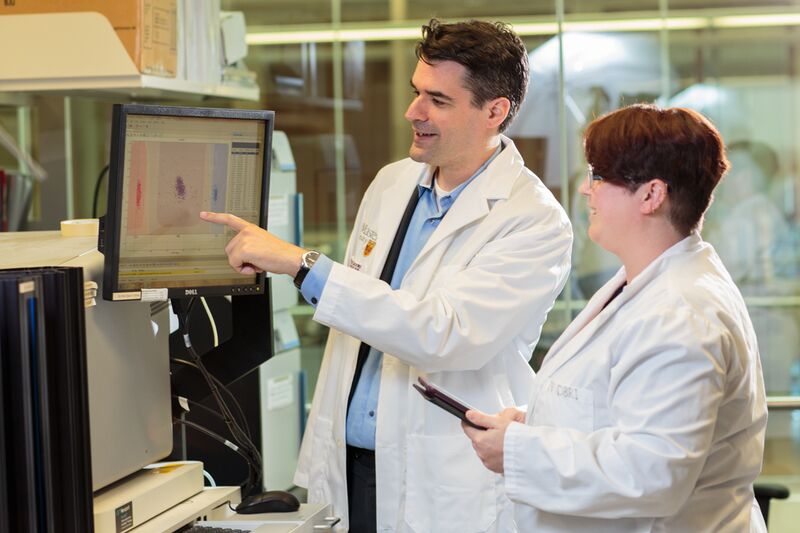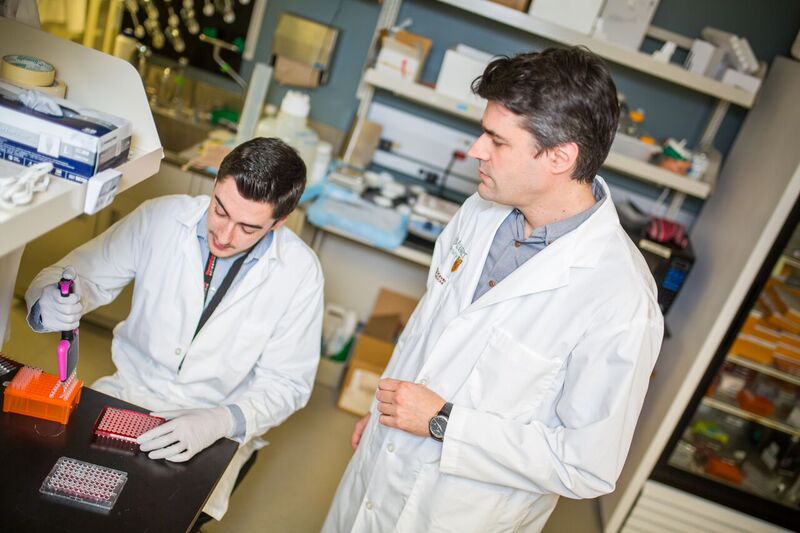
A heart disease detective
Learning the future from our genes
When the team at Hamilton General Hospital’s Lipid Clinic wants a genetics expert to review a patient’s file, Dr. Guillaume Paré is their man.
That’s because Dr. Paré, a Canada Research Chair and director of the genetic and molecular epidemiology laboratory at the Population Health Research Institute is a leading authority on genetics. He trained with world-class geneticists at the universities of Montreal, McGill and Harvard and specializes in understanding what our genes can tell us about our risk of suffering from cardiovascular disease. Heart disease and stroke claim a Canadian life every seven minutes, so these genetic predictors provide valuable insight.
“If someone has a genetic mutation, they tend to get cardiovascular disease approximately 10 years earlier than someone who doesn’t,” says Dr. Paré.
“Our hope is to identify a culprit genetic mutation to explain why the disease is presenting so aggressively.”
A patient’s age is often the reason Dr. Paré will get a referral. Many patients he sees have experienced cardiovascular disease at a very early age – typically men in their 30s and women under 45 years old –and are at risk of experiencing it again.
“If we suspect genetics are contributing to their condition, we will conduct further testing in the lab. Our hope is to identify a culprit genetic mutation to explain why the disease is presenting so aggressively. This is important not only for patients, but also for their families.”

Using the lab’s cutting-edge technology, Dr. Paré and his team of researchers hunt for abnormalities in the patient’s genetic makeup. These abnormalities, or mutations, allow researchers to make predictions about the likelihood a patient will experience further heart disease or stroke later on in life. Solving the puzzle behind a patient’s predisposition for heart disease allows Dr. Paré to provide better care and guidance that can help them avoid or delay serious complications.
“Essentially, having a mutation is like feeling the effects of smoking without being a smoker. Mutations don’t simply add to external risk factors, they multiply these risk factors,” notes Dr. Paré. “Knowing someone’s risk early gives them a bit of a head start against this risk.”
Collaborating to improve care
Dr. Paré is translating the techniques he uses with individual patients into large-scale research, so he can identify patterns in the types of people who tend to develop heart disease, and understand how we can best treat them.
Dr. Paré and his team recently led the genetics component on a trial involving over 18,000 patients from 44 countries. It studied the use of an anti-clotting drug for stroke prevention in patients with abnormal heart beats, and Dr. Paré was tasked with identifying genetic mutations in the participants. Among the findings: genetic abnormalities tend to occur in certain populations, and they can affect how patients respond to certain drugs. Armed with this information, clinicians may be able to use genetic information to inform the best course of treatment for a patient.
“That cutting edge research informs our clinical work so we can deliver the best outcomes to more patients.”
Bringing research to the bedside
The potential to harness this knowledge gained in the lab to directly benefit patients is the most encouraging aspect of Dr. Paré’s work. For his patients in the Lipid Clinic and many others, it could mean the difference between a long, healthy life and one that is cut short or impaired due to illness. Working both in the lab and at the bedside allows him to bring his findings full circle.
“My experience with individual patients drives me to undertake cutting edge research,” says Dr. Paré. “That cutting edge research informs our clinical work so we can deliver the best outcomes to more patients. I’m excited about what we’re doing here.”
